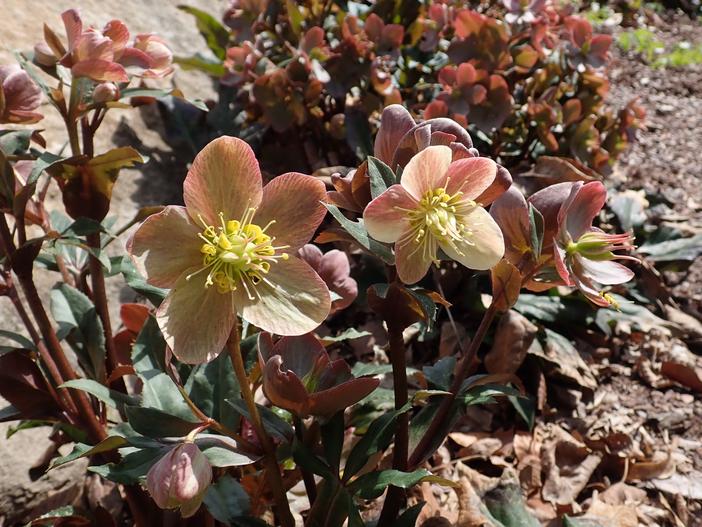Lenten Rose
(Helleborus ×ballardiae)
Lenten Rose (Helleborus ×ballardiae)
/
/

Salicyna
CC BY-SA 4.0
Image By:
Salicyna
Recorded By:
Copyright:
CC BY-SA 4.0
Copyright Notice:
Photo by: Salicyna | License Type: CC BY-SA 4.0 | License URL: https://creativecommons.org/licenses/by-sa/4.0 | Uploader: Salicyna | Publisher: Wikipedia Commons











Estimated Native Range
Summary
Helleborus ×ballardiae, commonly known as Lenten Rose, is a semi-evergreen perennial herb resulting from an artificial cross between Helleborus niger and Helleborus lividus. It typically grows to a height and width of 1-2 feet (0.3-0.6 meters), forming clumps of dark green, leathery, evergreen leaves. The Lenten Rose is not a true rose, but its rose-like flowers bloom in late winter to early spring, offering cream, pink, and white blossoms that are particularly showy against the barren landscape of the season. These flowers often persist into the spring, gradually fading to green. Its parent species are native to Europe, with Helleborus niger from the Alps and Apennines and Helleborus lividus from the Balearic Islands in the Mediterranean.
The Lenten Rose is valued for its early blooming period, providing color and interest during a time when few other plants are in flower. It is commonly used in shaded border plantings, woodland gardens, and as ground cover under deciduous trees. The plant prefers partial to full shade, consistent moisture without waterlogging, and well-drained soils rich in organic matter. While it is generally low-maintenance, it can suffer from problems such as leaf spot and crown rot if conditions are too wet. Additionally, all parts of the plant are toxic if ingested, so care should be taken if planted in areas accessible to pets or children.CC BY-SA 4.0
The Lenten Rose is valued for its early blooming period, providing color and interest during a time when few other plants are in flower. It is commonly used in shaded border plantings, woodland gardens, and as ground cover under deciduous trees. The plant prefers partial to full shade, consistent moisture without waterlogging, and well-drained soils rich in organic matter. While it is generally low-maintenance, it can suffer from problems such as leaf spot and crown rot if conditions are too wet. Additionally, all parts of the plant are toxic if ingested, so care should be taken if planted in areas accessible to pets or children.CC BY-SA 4.0
Plant Description
- Plant Type: Herb
- Height: 1-2 feet
- Width: 1-2 feet
- Growth Rate: Moderate
- Flower Color: Cream, Pink, White
- Flowering Season: Spring, Winter
- Leaf Retention: Evergreen
Growth Requirements
- Sun: Full Sun, Part Shade, Full Shade
- Water: Medium
- Drainage: Medium
Common Uses
Bee Garden, Border Plant, Deer Resistant, Drought Tolerant, Fragrant, Groundcover, Low Maintenance, Potted Plant, Rabbit Resistant, Rock Garden, Salt Tolerant, Street Planting
Natural Habitat
Of garden origin, with parent species from Europe
Other Names
Common Names:
Scientific Names: Helleborus ×ballardiae , Helleborus nigercors nothosubsp. ballardiae
GBIF Accepted Name: Helleborus ×ballardiae B.Mathew